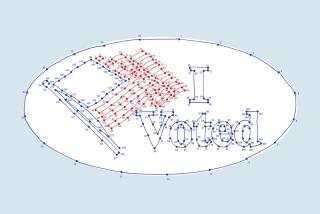Electing to Change How We Vote
- Share via
“Vote early and vote often, said William Porcher Miles in 1858. Today -- almost 150 years later -- no one any longer advocates voting often in an election, but for Americans throughout the country, voting early is increasingly popular.
This year’s California recall election was no exception. Between one-quarter and one-third of the votes were absentee. Millions of Californians made their minds up early and cast their ballots, missing the flurry of charges and countercharges in the final week of the campaign.
Californians’ method of voting mirrors a national trend. Over the last quarter of a century, a quiet revolution has changed the way many Americans vote.
In 1972, no state allowed early voting except by absentee ballot for those unable to get to a polling place, and only 4% of Americans opted for that. By 2000, as reported by the Caltech/MIT Voting Technology Project, 14% of ballots were cast absentee.
In some localities where an “excuse” is no longer necessary to vote absentee, more than 60% of ballots are now cast absentee.
More than 25 states allow in-person “early voting.” In Texas, for instance, more than one-quarter choose the early-vote option.
And of course, since 1996, all voters in Oregon have cast their ballots by mail. Approximately one month before “election day,” voter pamphlets are mailed to registered voters in Oregon, followed in a week by the ballot itself. Though Oregonians report a high level of satisfaction, the advertised benefits -- lower costs, more accurate counts and more thoughtful and deliberative voting -- are far less apparent.
Why have we caught the reformist bug? There is a good practical reason: cost.
Democratic elections are expensive affairs. The United States is unique among nations in the number and frequency of elections. The recall and initiative process is virtually nonexistent in other countries.
Furthermore, states and localities, rather than the federal government, control and pay for election administration in the U.S., unlike in other nations. Other alternatives -- a national election day holiday and a 24-hour voting period -- are cost-prohibitive.
Early voting is certainly a cheaper way to conduct democracy. And early voting might be a more accurate way to conduct it as well. The Cal Tech-MIT team found that voting by mail resulted in lower levels of “residual ballots,” those votes that for one reason or another are not counted. Subsequent research found that absentee ballots were also counted more accurately.
So if it is cheaper and more accurate, why not rapidly move to early voting? The first reason is that doing so would transform voting from a community and public act to an individualized and private act.
Americans have already lost faith in government and distrust their political leaders. Some believe that the erosion in the fabric of American civic life is a major cause of these changes.
Do we really want to end that most essential act of public participation: going to the polling place and casting a ballot?
The second, and perhaps more important, reason is that we don’t yet know how early voting changes campaigns.
It might be that early voting undermines the ability of campaigns to “go negative.” Depending on your partisan leanings, you may believe that the charges of sexual harassment against Arnold Schwarzenegger during the campaign were irrelevant and poisonous or you may think they provided crucial insights into his character and leadership.
One thing is sure: Anyone who voted absentee before the allegations were raised could not consider them. Were these voters cheated of important information or were they happily immune from last-minute negative attacks? The problem is we just don’t know.
On the other hand, campaigns don’t just focus the attention of campaigners; they also focus the attention of journalists and voters.
Most media outlets tend to concentrate their political coverage in the last week of the campaign. Under an early-voting system, newspapers and television stations would not know when to concentrate their efforts.
Similarly, voters pay attention to the news and collect political information more frequently as election day approaches. But if you voted two weeks earlier, you might as well ignore the rest of the campaign.
Ultimately, this debate may be academic. The pressures for reform are unavoidable.
“Election day” in the United States is rapidly turning into an anachronism. Waiting in line to cast our ballots will become the quaint notion of a bygone era. Within a decade, it is likely that most of us will vote from the comfort of our own homes, either by filling out ballots and mailing them in or by firing up our computers and voting over the Internet. But if we are going to change this fundamental act of democratic citizenship, it should be for reasons far more important than cost or convenience.
Early voting may erode the quality of democratic choice, and if so, it is a reform that we adopt at our peril.
More to Read
Get the L.A. Times Politics newsletter
Deeply reported insights into legislation, politics and policy from Sacramento, Washington and beyond. In your inbox twice per week.
You may occasionally receive promotional content from the Los Angeles Times.








